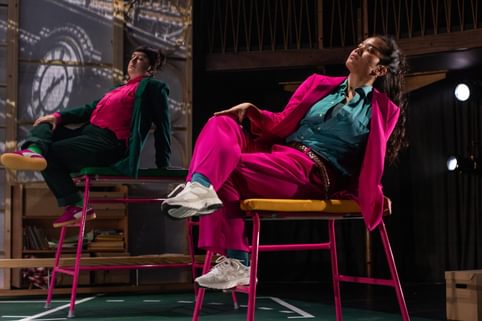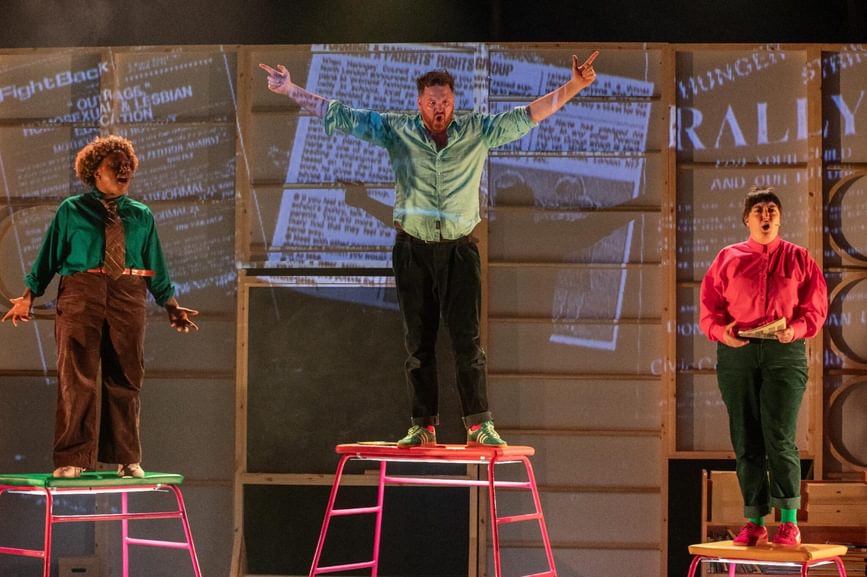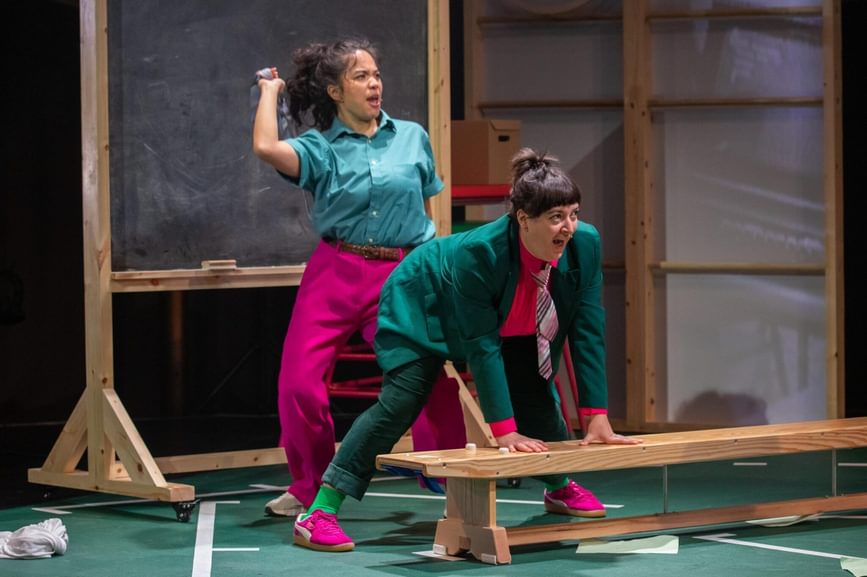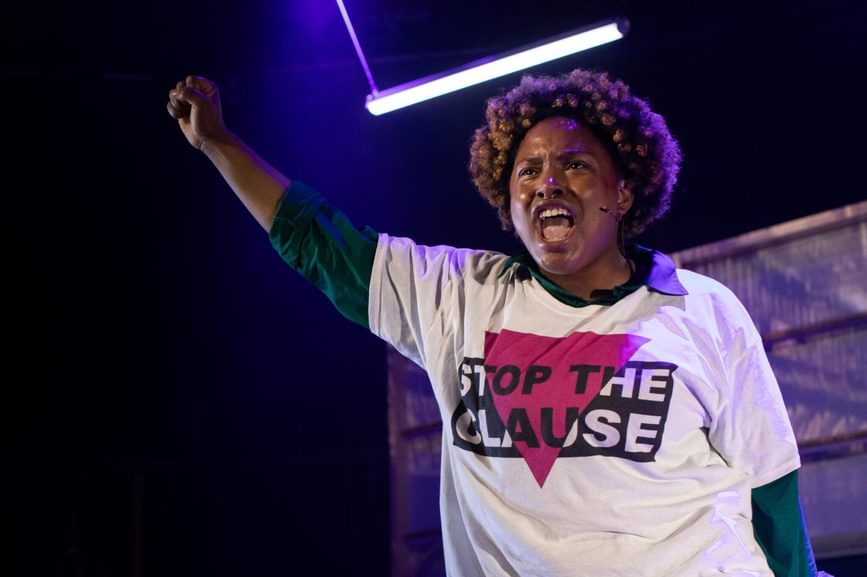News Story
After the Act is a new musical with an original 80s-inspired score. It uses verbatim accounts and written transcripts to tell the stories of individuals who lived under Section 28. This was Thatcher’s oppressive censorship legislation that prevented local authorities from ‘promoting’ homosexuality. We caught up with one of Breach Theatre’s co-founders, Billy Barret, to find out more about the show and its development.

What can audiences expect from After the Act, without giving too much away?
Audiences can expect to learn a lot about a really crucial piece of LGBT history. And how it continues to impact and shape the lives of a whole generation of queer people. The show tells that story by interweaving the personal narratives of students, teachers and activists. It explores their experiences of the legislation, heated debates in parliament, and some wildly brave and inventive protests.
It’s kind of a narrative collage, with four actors playing a huge cast of characters. They sing us through several decades of British history with an original, synth-underscored 1980’s 1980s-inspired score. It has some incredibly catchy tunes. Audiences can expect to be moved, entertained. Hopefully, it will be inspired by the stories of those who spoke out against a really repressive, censorious law.
Tell us about how Breach was formed.
We formed the company in 2015, as graduates of Warwick University. We’d made our first show, The Beanfield, there. That was quite an unconventional documentary theatre piece blending live performance with documentary film footage. It traced our attempts to reenact an infamous 1980s clash between New Age Travellers and police at Stonehenge. We explored which national historical events are commemorated and which are forgotten. We were lucky enough to win a Total Theatre Award for that show at the Edinburgh Fringe, and get our next few shows commissioned. These included a surreal, Americana-infused dramatisation of a series of 1970’s experiments into teaching dolphins English and a reconstruction of a 17th Century rape trial. Our almost decade-long collaboration has always been about exploring the boundaries and possibilities of documentary theatre. Using it to tell urgent, politically resonant stories – and now culminating in this brand new verbatim musical!
What made you want to tell the story of Section 28 now, and as a musical?
I remember discovering a few years ago that I had been at school under Section 28. We think of it as a relic of the 1980s. But in fact, it wasn’t repealed in England until 2003 – my first year of secondary school. As I’ve since learned, although it was then taken off the statute books, in practice it cast a really long shadow over education. Teachers remained afraid to confront LGBT topics in schools for a very long time. This explained a huge amount about the ways that people of different sexualities or gender identities were talked about – or rather weren’t talked about – at my school. And the oddly coy behaviour of teachers when asked directly about those topics.
When I realised the 20th anniversary of its repeal was coming up in 2023, I suggested to my co-writer Ellice and our musical collaborator Frew that we try and tell the story of the legislation. The anniversary was an opportunity to have a look at how much, or little, has changed in the intervening years. We were excited by the possibility of using music to access the world of 1980s Britain. And by the challenge of combining that with Breach’s usual investigative, research-led approach.

Tell us about the process of developing After the Act and collecting the real, verbatim accounts used?
Oddly enough, the very first person that we interviewed for the show was Sir Ian McKellen. He was a really key figure in the fight against Section 28 and the establishment of what became Stonewall. They are the UK’s leading LGBT campaigning organisation. He was so generous with his time. And he shared some fascinating memories with us, including of his own public coming out on a BBC radio debate about Section 28. Ultimately, we decided not to ask him if we could include his story. He’s such a well-known and beloved person. And he has already spoken of his experiences during that period far more eloquently and compellingly than we ever could!
But his enormous personal archive of campaign posters, flyers, meeting minutes and correspondence led us to discover Before the Act. This was a fundraising variety evening he had a hand in putting together before Section 28 passed in 1988. It featured a whole host of brilliant actors performing songs and scenes by queer writers. That gave us our title. It inspired us with the idea of blending songs and scenes, though in a very different way, to tell the less well-known stories of people around the country impacted by the legislation. We then underwent quite a lengthy research process. We interviewed a large number of people and collated our own vast archive of news clippings and footage. There were some really emotionally charged, informative and often funny conversations with the people who trusted us with their stories. Together, they form the through-line of the show.

What are some of the biggest challenges you faced in creating After the Act?
First of all, there was an enormous formal challenge in setting real recorded speech to music. There aren’t that many verbatim musicals around, and that’s a good reason why! Undoubtedly, the most famous example, which pioneered the form and proved it was possible, is London Road by Alecky Blythe. It’s a total technical masterpiece. She worked closely with composer Adam Cork to create the score based on the intonation and speech rhythms of interviewees. Because we were working from a lot of written transcripts, like parliamentary debates, this approach wouldn’t make sense to us. We were also keen to discover our own unique style.
We instead immersed ourselves in the musical genres of the time. Many of our songs began by combining a particular monologue or scene with a musical reference. We had a lot of fun clashing together unexpected contrasts. For example a Billy Bragg-style protest song using the words of right-wing, homophobic campaigners. Or a Bronski Beat-inspired electronic club banger, comprised of horrific tabloid headlines about the AIDS epidemic.
Beyond the music, we faced the sheer scale of the research. The narrative wrangling we had to do to make it feel cohesive and gripping was also massive. It’s definitely the trickiest, most complex show we’ve ever made. But for that reason it’s the one we’re most proud of.
What have you most enjoyed in the process?
There’s been a really cathartic element of this for me – to explore this huge, landmark political story through the lens of many personal narratives, many of which chimed with my own experience. I’ve had a Section 28 show brewing at the back of my mind for a number of years. So there’s an enormous satisfaction in having dived in and created it collaboratively with such a fantastic team. One of the most fulfilling parts of the process was definitely the interviewing stage. My co-writer Ellice and I were able to meet so many queer people of different generations. There was something wonderful, although often very sad, about finding connections in what people expressed and remembered. Even if they might be totally different ages, or come from very different backgrounds.

As people who grew up under Section 28, how do you think it impacted your lives?
It’s interesting because when you ask people what their memories of Section 28 are, of course, they don’t have any. By definition, it was about a void, or an absence of something. And personally, that absence really impacted my ability to make sense of who I was as a young person and as an adolescent, and created a lot of fear and confusion. I have a really strong memory of someone in primary school asking during a sex education lesson how what we were learning might apply to a lesbian relationship. They were told that we weren’t allowed to talk about it. This was in a secular, state primary school in the early 2000s. The impact of that seemingly innocuous comment, and its implication that this is something forbidden and shameful, is enormous, particularly when you’re just beginning to try to understand your own identity.
Something I’ve also been thinking about since making this show is one of the cruellest ironies of Section 28. At the height of the AIDS crisis, young people were denied information about safer sex. That would have prevented the spread of HIV and led to fewer transmissions and deaths. And in the years following Section 28’s repeal, when there was still a massive hesitancy to discuss same-sex relationships, up-to-date information about HIV and its vastly improved treatment outcomes wasn’t really filtering down into schools.
So there was this deep residual terror, a hangover from the 1980s, about AIDS. I remember it being pressed on me in childhood. But it actually no longer reflected the reality of what a diagnosis meant. It wasn’t at all clear to me that people who were HIV+ were beginning to manage the condition and live normal lives. It’s only in the last few years that I’ve begun to interrogate that and realise there was so much damaging misinformation. There was a lack of knowledge in that period of the late 1990s and early 2000s. I think it contributed to a lot of anxiety and internalised homophobia.
Do you think there have been cultural repercussions of Section 28?
Definitely – and because it was a law about censorship, we’ll never know what kinds of cultural output were actually repressed and so never came to fruition. As far as I know, there were no actual prosecutions of schools or other publicly funded institutions under Section 28. But instead, there was a huge over-cautiousness on behalf of those organisations to not run afoul of the law. We read many articles and accounts of plays with LGBT themes being cancelled at publicly funded theatres or in schools during the Section 28 era. So many others would then have been vetoed before they even got to that point. So it’s interesting and pretty chilling to think that if Section 28 were in place today, we would almost certainly not be able to stage this show.
There are strong comparisons to the events that led up to Section 28 being enacted, and current discourse and misinformation on different gender identities. What do you think we should learn from the past to ensure we don’t repeat mistakes?
Absolutely, and that comparison is one large part of why we decided to make this show. It’s not one that we make flippantly or in a simplistic way. But we’re far from the only ones to point out the strong parallels between the really shocking media treatment of gay people in the 1980s and that of trans people today, or the repressive laws brought about as a result. We spent a lot of time reading through the Bishopsgate Institute’s LGBT news archives whilst writing After the Act. Those historical echoes, particularly in the language and tropes of perversion and child protection, were really glaring. In both instances, we’ve seen how that kind of vitriolic, often ill-informed obsession with LGBT people can have a direct impact on government policy and cause real damage to people’s lives.
So we do make that link in After the Act. But we also try to let the audience do a lot of that piecing together and reflecting themselves. There is certainly an invitation in the show to consider the past in relation to our fraught, polarised present. And to think about what side of history you would like to be on.
After the Act comes with a content warning to advise audiences that it may be distressing and triggering for some. Tell us your thoughts on how these warnings benefit audiences and the industry.
As a company, we see content warnings as an accessibility issue. It’s essential to inform an audience about technical aspects like strobing lights that might trigger a medical condition. It’s necessary to outline themes and subject matter that might be traumatic for certain audience members. It’s as simple as that, particularly with this kind of show that explores some fairly difficult experiences. Care for our interviewees, cast and audiences is paramount. I think it’s a massively positive step that content warnings are becoming common practice. I don’t have much time for certain voices in our industry making misinformed comments about them. Or those media outlets trying to manufacture some kind of culture war around a few sentences at the bottom of some show copy.
What do you hope audiences will take away from After The Act?
We try never to be didactic with our shows. We’d never want to tell people exactly what they should take away. But I do really hope that people come away a lot more informed about our history. And also galvanised by the huge wave of protests that rose up against Section 28. I think the story of Section 28 shows us that social progress is never guaranteed. That, unfortunately, is more like a pendulum swinging one way and then the other. It’s a story about how a moment of greater visibility and rights for LGBT people was very swiftly followed by a media backlash and a massive government clampdown. Something that feels all too familiar today.
So I think After the Act is a show that tries to remind us not to be complacent. That our hard fought-for rights are not necessarily as safe as we might like to think. That we have to keep vigilant, keep vocally fighting to hold onto them. And to secure those rights for other marginalised groups… sometimes through the medium of song!
After The Act was on at the Connaught Theatre in November 2024.
